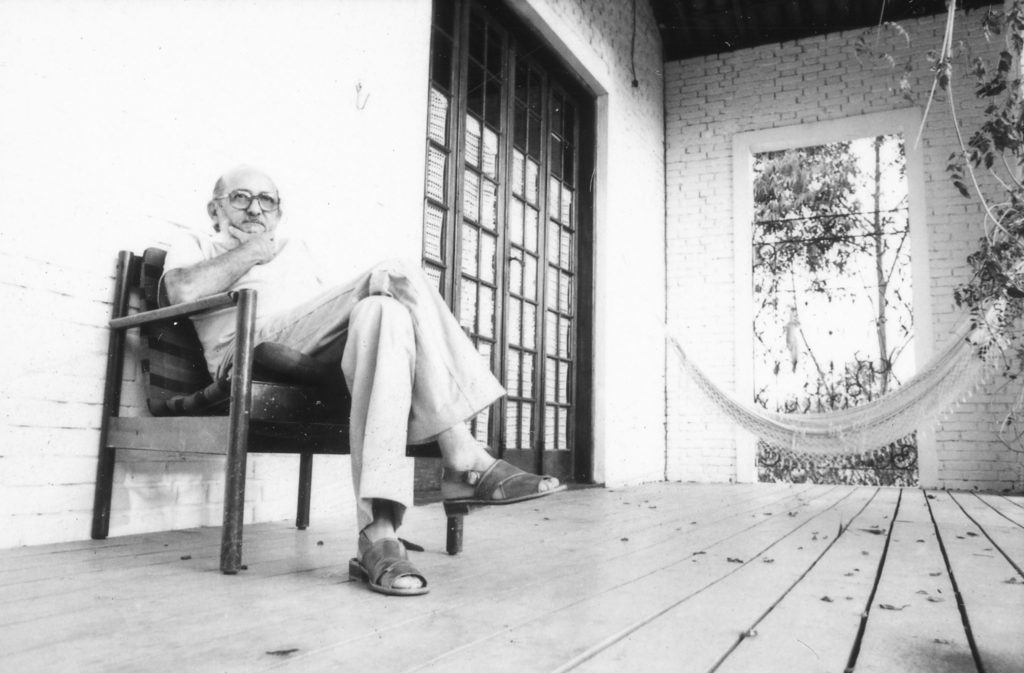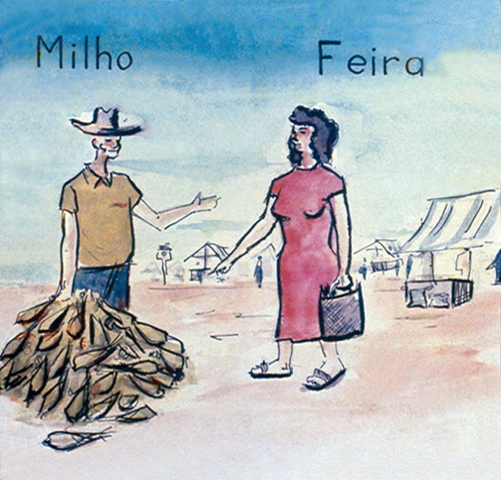
In the 1970s, the educator and philosopher Paulo Freire was interviewed by the newspaper Jornal da Tarde. In his house, in the city of São Paulo, he talks about the critical pedagogy movement (image: João Pires/Estadão Conteúdo)
In order to understand the successful experience “40 hours of Angicos”, a practical – and educational milestone – responsible for teaching 300 people to read and write in 40 hours, it is essential to know some moments of the academic and academic trajectory of Paulo Reglus Neves Freire.
Born in 1921, in the neighborhood of Casa Amarela, in Recife (PE), he obtained, in 1937, a scholarship to attend secondary education at Colégio Oswaldo Cruz, where he became a Portuguese language teacher – his first teaching experience. In the 1940s, he entered the Recife Faculty of Law, where he graduated in 1947. Despite the course, he never practiced the profession.
In 1962, Paulo Freire and the dean João Alfredo created the Cultural Extension Service of the University of Recife, in Pernambuco, a pioneering action: it is the first systematic university extension activity in Brazil.
The law that appoints the teacher as the Patron of Brazilian Education dates from April 13, 2012.
Seção de vídeo
Educator Paulo Freire describes the process of how he became an educator and recalls his first experiences as a teacher, pointing out their importance for rooting him in the pedagogical practice. Art educator Ana Mae Barbosa, a student of Paulo Freire, tells about the paths that led her to him and recalls his attitude as a teacher, emphasizing the importance the educator had in her own personal path.
In the 1970s, the educator and philosopher Paulo Freire was interviewed by the newspaper Jornal da Tarde. In his house, in the city of São Paulo, he talks about the critical pedagogy movement (image: João Pires/Estadão Conteúdo)
Seção de vídeo
Educator Paulo Freire talks about his being invited to participate in the experiment in Angicos, Rio Grande do Norte, and the conditions he demanded. Those conditions allowed the Alliance for Progress to keep a distance from the negotiations – which took place only between the universities and the Secretary of Education – thus conserving the project’s political and pedagogical autonomy. Professor and lawyer Marcos Guerra talks about the importance of the experiment and analyzes the difference between the traditional process of teaching literacy and the method proposed by Paulo Freire.
After initial experiments in the Popular Culture Movement (MCP) and in the Campaign for Popular Education of Paraíba (Ceplar), Paulo Freire systematized the teaching of literacy to adults in the Cultural Extension Service (SEC) of the University of Recife and, in 1963, carried out the experiment in Angicos (RN). The project taught 300 people how to read and write in just 40 hours of instruction.
1/10
Seção de vídeo
Professor and lawyer Marcos Guerra, coordinator of the project in Angicos, Rio Grande do Norte, that was conceived and overseen by Paulo Freire, describes the educator’s willingness to modify his theory according to what was analyzed in practice. Guerra also talks about his path in political activism at the university and in campaigns and movements for the teaching of literacy that were carried out. The professor recalls the conditions imposed by Paulo Freire when he was invited to work in Angicos, one of which was full pedagogical and political independence. He comments about the impact of the teaching of literacy on the electoral process, in light of the fact that only literate citizens had the right to vote.
1963: The survey of the local vocabulary universe is a fundamental part of the method for the teaching of literacy developed by Paulo Freire
Seção de vídeo
The students who participated in the experiment in Angicos, Rio Grande do Norte – Maria Eneide, Maria Lucia da Silva Andrade, Francisca de Brito, Antonio Lopes, Luzia de Andrade and Valdice Ivonete da Costa Santos – recall the mobilization that occurred upon the arrival of the team of educators in the city and the resistance of some family members against attending the classes; they also describe the process of the teaching of literacy and how learning to read reverberated in their way of being in the world.
Seção de vídeo
Educator Paulo Freire tells how learning together with the popular groups was an important component for his training, constructing an understanding of class differences from the point of view of language. Writer Frei Betto recalls the experiments in the teaching of literacy in the movement of the Juventude Estudantil Católica (JEC) secondary school students, when they began to apply principles from Paulo Freire’s method. He talks about the power of the method for understanding life as a historical process rather than a biological one, and how it is an important factor in the recovery of human dignity.
by Sérgio Haddad*
When constructing a pedagogy based on a dialogue about authoritarianism with a worker
“Now look, doctor, at the difference. You arrive home tired. You even have a headache from the work you just did. Thinking, writing, reading, speaking these sorts of speech that you just did here. All of that is also tiring. But it’s one thing to arrive home tired, finding the children already bathed, dressed, clean, well fed, without hunger, and another thing altogether to find the kids dirty, hungry, yelling, all noisy. And we have to wake up at four in the morning the next day to start everything again, in the pain, in the sadness, in the lack of hope. If we hit our kids and even lose control it is not because we don’t love them, no. It is because life’s hardship does not leave much choice.”
The worker’s words moved everyone present, but Paulo was particularly sensitive to them. The uneasiness generated by the comparison between his world and that of the worker was for him another lesson that transformed his way of understanding the educational process.
Paulo had already been making an effort to bring his speech closer to that of the parents and students who attended the Sesi schools. He thought that much of the lack of understanding in the dialogue arose from a discursive distancing, so the closer he got to the language of the workers, the greater possibility they would have for understanding one another.
The words spoken by that father and worker allowed Paulo to understand another dimension: it did not involve only an adaptation of language. It was necessary to go deeper, to know the way of life of the workers and how they interpreted the world in which they lived, since, after all, the language of the workers was a product of this reality.”
Sérgio Haddad holds a degree in economics and pedagogy, and a PhD from the University of São Paulo (USP). A former professor in the Postgraduate Program in the Education of the Pontifícia Universidade Católica de São Paulo (PUC/SP) and of the University of Caxias do Sul, he is currently participating in the coordination of the NGO Ação Educativa. A senior CNPq researcher, he recently released the book O Educador: um perfil de Paulo Freire published by Todavia.
*The cited passages are excerpts from O educador, um perfil de Paulo Freire.
Seção de vídeo
Educator Paulo Freire recalls the precariousness of the schools in São Paulo when he took over at the helm of the Municipal Secretariat of Education, and tells about the work to modify that reality, offering an adequate structure, fostering quality teaching and the democratization of schools. Philosopher Mario Sergio Cortella discusses how the previous government administrations impacted education during Paulo Freire’s tenure in the secretariat, the problems faced by that new administration, and their solutions. Educators Moacir Gadotti and Ângela Antunes also share recollections, stories and experiences.
“The educator, in a process of raising awareness (or not), as a man, has the right to his choices. He does not have the right to impose them. If he tries to do that, he is prescribing his choices to the others; by prescribing them, he will be manipulating; by manipulating, he will be ‘reducing humans to things,’ and by doing that, he will establish a relationship of ‘domestication’ which can moreover be disguised under apparently inoffensive clothing.”
"Extensão ou comunicação?", position 1226 (e-book)
